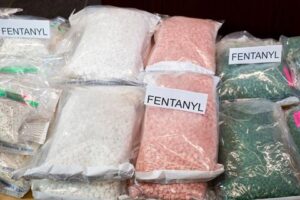China Cracks Down on Fentanyl Precursor Chemicals Amid Growing International Pressure

China Cracks Down on Fentanyl Precursor Chemicals Amid Growing International Pressure

China Cracks Down on Fentanyl Precursor Chemicals Amid Growing International Pressure
In response to increasing international pressure and the global opioid crisis, the Chinese government has announced a major crackdown on the production and export of fentanyl precursor chemicals. These chemicals, which are essential in the illicit manufacture of fentanyl, a potent synthetic opioid, have been linked to the dramatic rise in overdose deaths, particularly in the United States.
The Ministry of Public Security in China has initiated a nationwide operation targeting manufacturers and distributors of fentanyl precursor chemicals. This effort is part of a broader campaign to curb the illicit drug trade, which has seen China come under intense scrutiny for its role as a primary source of these chemicals.
The operation, led by Minister of Public Security Wang Xiaohong, involves coordinated raids across multiple provinces, including Guangdong, Zhejiang, and Jiangsu, where the production of these precursor chemicals is most prevalent. Chinese authorities have already arrested dozens of suspects and shut down several clandestine laboratories. According to official reports, these labs were producing large quantities of chemicals such as 4-anilino-N-phenethylpiperidine (ANPP) and N-phenethyl-4-piperidone (NPP), both of which are key precursors in the synthesis of fentanyl.
Minister Wang stated, “The Chinese government is fully committed to fighting the illegal drug trade. We recognize the devastating impact that fentanyl and its precursors have had on communities worldwide, and we will not tolerate the illegal production and distribution of these substances.”
China’s crackdown comes amid growing pressure from the international community, particularly from the United States, which has been grappling with a severe opioid crisis. Fentanyl, which is 50 to 100 times more potent than morphine, has been a major contributor to the surge in overdose deaths in the U.S., with the Centers for Disease Control and Prevention (CDC) reporting over 70,000 opioid-related deaths in 2023 alone.
U.S. officials have long called on China to take stronger action against the production and export of fentanyl precursors. In recent months, the Biden administration has intensified diplomatic efforts to address the issue, culminating in a series of high-level meetings between U.S. and Chinese officials.
During a recent summit in Beijing, U.S. Secretary of State Antony Blinken met with Chinese Foreign Minister Qin Gang to discuss the fentanyl crisis. Secretary Blinken expressed the urgency of the situation and urged China to take decisive action against the production of precursor chemicals. Following the meeting, Foreign Minister Qin Gang pledged China’s cooperation and reaffirmed the country’s commitment to combating the illegal drug trade.
“The United States appreciates China’s efforts to address the global fentanyl crisis,” Secretary Blinken said in a statement. “We will continue to work closely with China and other international partners to combat the trafficking of illicit drugs and the chemicals used to produce them.”
China’s crackdown on fentanyl precursors is expected to have significant implications for the global drug trade. For years, China has been the primary source of these chemicals, which are often shipped to Mexico, where they are synthesized into fentanyl and smuggled into the United States. By targeting the production of these precursors, Chinese authorities hope to disrupt the supply chain and reduce the availability of fentanyl on the international black market.
In addition to shutting down production facilities, Chinese authorities have also announced stricter regulations on the sale and export of precursor chemicals. New licensing requirements and enhanced monitoring systems will be implemented to prevent these chemicals from being diverted to illegal channels. The government has also committed to increasing cooperation with international law enforcement agencies to track and intercept shipments of illicit drugs and chemicals.
Zhou Rui, Deputy Director of the Narcotics Control Bureau, emphasized the importance of international cooperation in combating the global drug trade. “The fight against illegal drugs is a shared responsibility that requires a coordinated global effort,” Zhou said. “China is committed to working with other nations to combat drug trafficking and to prevent the misuse of chemical substances.”
While China’s crackdown on fentanyl precursor chemicals is a significant step forward, challenges remain in the fight against the global opioid crisis. Experts warn that drug traffickers may adapt by shifting production to other countries or by developing new synthetic routes that circumvent current regulations.
Dr. Zhang Wei, a prominent Chinese pharmacologist, noted, “While the crackdown on fentanyl precursors is a positive development, it is important to recognize that the synthetic drug market is highly adaptable. Traffickers are likely to seek out alternative sources of chemicals or develop new methods to produce fentanyl. Continuous vigilance and international cooperation will be crucial to sustaining the impact of these efforts.”
The Chinese government has acknowledged these challenges and has pledged to remain vigilant in its efforts to combat the illicit drug trade. In addition to the current crackdown, Chinese authorities are investing in new technologies and intelligence-sharing platforms to stay ahead of emerging threats.
China’s crackdown on fentanyl precursor chemicals marks a significant step in the global effort to combat the opioid crisis. By targeting the production and distribution of these critical chemicals, Chinese authorities are taking a strong stance against the illicit drug trade and demonstrating their commitment to international cooperation.
As the world watches the outcome of this crackdown, the success of these efforts will depend on sustained vigilance, adaptability, and continued collaboration between China, the United States, and other international partners. The global community remains hopeful that these actions will lead to a reduction in the availability of fentanyl and, ultimately, save lives.
Do you find Tmaq Media useful? Click here to give us five stars rating!

























